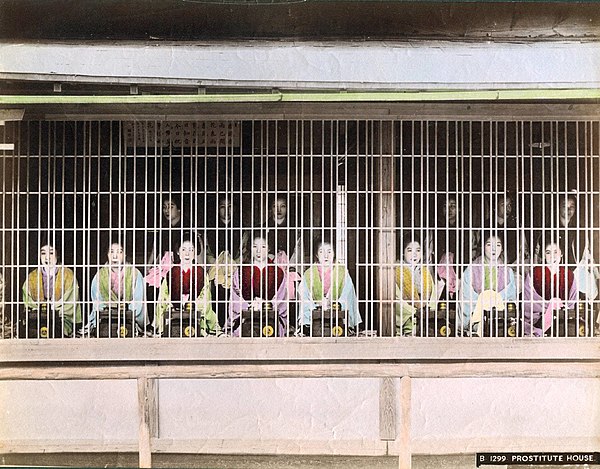| Main page | Recognized content | Subcategories |
Welcome to the human sexuality portal
Human sexuality is the way people experience and express themselves sexually. This involves biological, psychological, physical, erotic, emotional, social, or spiritual feelings and behaviors. Because it is a broad term, which has varied with historical contexts over time, it lacks a precise definition. The biological and physical aspects of sexuality largely concern the human reproductive functions, including the human sexual response cycle.
Someone's sexual orientation is their pattern of sexual interest in the opposite and/or same sex. Physical and emotional aspects of sexuality include bonds between individuals that are expressed through profound feelings or physical manifestations of love, trust, and care. Social aspects deal with the effects of human society on one's sexuality, while spirituality concerns an individual's spiritual connection with others. Sexuality also affects and is affected by cultural, political, legal, philosophical, moral, ethical, and religious aspects of life.
Interest in sexual activity normally increases when an individual reaches puberty. Although no single theory on the cause of sexual orientation has yet gained widespread support, there is considerably more evidence supporting nonsocial causes of sexual orientation than social ones, especially for males. Hypothesized social causes are supported by only weak evidence, distorted by numerous confounding factors. This is further supported by cross-cultural evidence, because cultures that are tolerant of homosexuality do not have significantly higher rates of it.
Evolutionary perspectives on human coupling, reproduction and reproduction strategies, and social learning theory provide further views of sexuality. Sociocultural aspects of sexuality include historical developments and religious beliefs. Some cultures have been described as sexually repressive. The study of sexuality also includes human identity within social groups, sexually transmitted infections (STIs), and birth control methods. (Full article...)
Selected article
Estimates vary as to how many women were involved, with most historians settling somewhere in the range of 50,000–200,000; the exact numbers are still being researched and debated. (Full article...) (Full article...)
Selected image
Did you know

- ... that Don't take it personally, babe, it just ain't your story has been described as a profoundly moving video game about love, sex and the internet?
- ... that when Dan Savage's book Savage Love was published, his advice column of the same name had 4 million readers? (author pictured)
- ... that over 16,000 aborted fetuses were found in the Los Angeles fetus disposal scandal in 1982?
January - June 2011
Human sexuality in the news
- 3 October 2024 – LGBT rights in Georgia
- Georgian LGBT propaganda law
- The Georgian Parliament Speaker signs into law a wide-ranging bill that bans gender transitioning and gender-affirming care, same-sex marriage and adoption, and depictions of LGBTQ+ people in media after the President refused to sign it, which chief European Union diplomat Josep Borrell states could prevent the nation's accession to the EU. (Politico)
- 24 September 2024 – Recognition of same-sex unions in Thailand
- Thailand passes the marriage equality law allowing same-sex couples to be legally wed starting in January 2025. (AP)
- 17 September 2024 – LGBT rights in Georgia
- The Parliament of Georgia approves a law on "family values and the protection of minors" that would restrict LGBTQ+ rights in the country. (DW)
Get involved
For editor resources and to collaborate with other editors on improving Wikipedia's Human sexuality-related articles, see WikiProject Sexology and sexuality.
Topics
Tasks

- Cleanup listing for WikiProject Sexology and sexuality — bot-generated list of articles within the scope of this WikiProject tagged as needing attention
- Cleanup listing for WikiProject LGBT studies — bot-generated list of articles within the scope of this WikiProject tagged as needing attention
Related portals
Associated Wikimedia
The following Wikimedia Foundation sister projects provide more on this subject:
-
Commons
Free media repository -
Wikibooks
Free textbooks and manuals -
Wikidata
Free knowledge base -
Wikinews
Free-content news -
Wikiquote
Collection of quotations -
Wikisource
Free-content library -
Wikiversity
Free learning tools -
Wiktionary
Dictionary and thesaurus





















